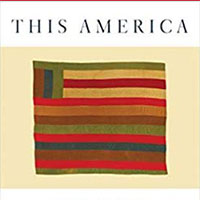— book review by Jens Kruse —

In May of 2019, a mere eight months after the publication of her monumental history of the United States, These Truths (which I recently reviewed in this space: orcasissues.com/kruse-reviews-these-truths-by-jill-lepore/), Jill Lepore followed up with This America. The Case for the Nation.
If you were to look at the two volumes next to each other on the shelves of the Orcas Library they would seem very different: one fat and tall, the other slim and short. Next to the nearly 800 text pages of These Truths the 138 small text pages of This America seem insubstantial. But do not be misled by these ephemeral differences: This America is in many ways just as important and consequential as the larger volume.
In her history, Lepore had said: “The work of the historian is not the work of the critic or of the moralist.” In this essay, she is still very much the historian, its pages are very much grounded in the history she tells in the larger volume. But as essayist she is also the critic and the moralist.
As critic, she takes to task her profession which over a period of time after World War II and increasingly through the 60s, 70s, and beyond gave up on writing national history in favor of writing the history of groups on the one hand and global history on the other. This was done with all the best intentions. Historians had come to believe that by not writing about nations and nationalism, that force that had showed itself to be so destructive in recent history would wither and die for lack of attention. But nationalism did not die just because scholars stopped writing about it. And, as Lepore makes clear, “when scholars stopped writing national history, other, less scrupulous people stepped in” (19). She continues:
Nations, to make sense of themselves, need some kind of agreed upon past. They can get it from scholars or they can get it from demagogues, but get it they will. The endurance of nationalism proves that there’s never any shortage of fiends and frauds willing to prop up people’s sense of themselves and their destiny with a tissue of myths and prophecies, prejudices and hatreds, or to pour out the contents of old rubbish bags full of festering incitements, resentments, and calls to violence. When serious historians abandon the study of the nation, when scholars stop trying to write a common history for a people, nationalism doesn’t die. Instead, it eats liberalism.
Liberalism is still in there. The trick is getting it out. There’s only one way to do that. It requires grabbing and holding on to a very good idea: that all people are equal and endowed from birth with inalienable rights and entitled to equal treatment, guaranteed by a nation of laws. This requires making the case for the nation. (19-20)
To do so, she undertakes three tasks: to “explain the origins of nations,” to offer “a brief history of American nationalism,” and to make “the case for the nation, and for the enduring importance of the United States and of American civic ideals, by arguing against nationalism, and for liberalism.”
As part of her “brief history of American nationalism” Lepore explains that:
Since about the middle of the twentieth century, people who have wanted to wrest the word “nationalism” away from the bloody hands of tyrants have tried to distinguish between “good nationalism” and “bad nationalism.” By good nationalism, they usually mean liberal or civic nationalism, an attachment to a set of civic ideals. By bad nationalism, they usually mean illiberal or ethnic nationalism, nativism, racism, and recourse to aggression. American nationalism is often figured as one or the other, but really it’s almost always been both. (58)
In the penultimate chapter of her essay Lepore identifies and decries the return of that bad nationalism, in the United States and elsewhere. But she follows that up with a rousing last chapter in which she invokes “ A New Americanism.” She writes:
The United States is a nation founded on a revolutionary, generous, and deeply moral commitment to human equality and dignity. In the very struggles that constitute this nation’s history, in the very struggles that lie ahead, the United States holds to these truths: all of us are equal, we are equal as citizens, and we are equal under the law. For all the agony of the nation’s past, these truths remain. Anyone who affirms these truths and believes that we should govern our common life together belongs in this country. That is America’s best idea. (135)
This America. The Case for the Nation. (New York: Liveright Publishing, 2019) can be checked out from the Orcas Library. It is available through Darvill’s Bookstore.









Delicious! That the Kruse review this time is posted (for a moment) directly below the Sandburg quote. Seems like a worrisome majority of news items of late are enthusiastically publicizing those who dramatically pound the table and yell.
I agree with Jens here, everyone should read Lepore’s beautifully written short but dense with information essay.